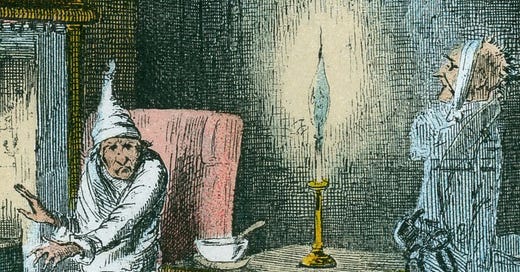Merry week of Christmas! For the holiday week, I’m recycling a piece I wrote for the Atlanta Journal-Constitution back in 2007. I think it’s still relevant to our child welfare work today.
Many of you this time of year recall the story of Ebenezer Scrooge in Charles Dickens' A Christmas Carol: the heartwarming tale of how the penurious old coot is transformed by the Spirit of Christmas. But the novella, along with Dickens' other works, carries a far greater legacy than merely giving us the phrases "Bah, Humbug!" and "God bless us, every one!"
Truth be told, Dickens' novel changed not only our Christmas traditions but also our world.
Dickens wrote "A Christmas Carol" with the express purpose of reforming an industrial society consumed with making money. The England of the early 1800s was a place in which factory owners could essentially "purchase" children from the orphanages and put them to work for 16-hour shifts in dangerous factories. It was a society in which children as young as 6 or 7 were often killed or maimed by industrial machinery. And, more personally for Dickens, it was a place in which men such as Dickens' own father could be thrown into prison for their debts, forcing the future author at age 12 to pawn his books and work long days blacking boots in a factory.
Dickens wrote not just to entertain but also to change the hearts and minds of his countrymen, and he succeeded beyond his own great expectations. As one scholar has stated, it was Dickens who took the message of social reform to ordinary English readers with such clear illustrations that they could relate to the plight of the needy child and the working poor. He helped birth a new spirit of selflessness and giving.
From Dickens' efforts grew movements in England and America to stop child labor, to rescue the poor from debtors' prisons, and to protect the orphaned child from abuse and exploitation. And the movement those Victorian social reformers began over 175 years ago continues today through the work of the thousands of government employees, nonprofit organizations and individuals who devote their time to caring for the most vulnerable members of our society.
"Mankind was my business!" the ghost of Jacob Marley wails to Scrooge. "The common welfare was my business; charity, mercy, forbearance, and benevolence were all my business!'
The message Marley brought to his old business partner is a message we need to hear every day, not just at Christmas. And thousands of people respond to that message throughout the year, taking time from their busy lives to take action: becoming foster parents and mentors, assisting youth aging out of care, supporting the work of child advocacy organizations. Like Scrooge, these selfless individuals have found the Spirit that is in Christmas and "keep it well!'
"A Christmas Carol" also reminds us that it is our individual responsibility to help those in need. Like Scrooge, we often simply want to be "left alone!' To the pre-Christmas Scrooge, it was enough that his taxes supported the government institutions - the workhouses, the debtors' prisons - that "assisted" the poor and needy of his day. That laissez-faire reliance on the government to protect us from Ignorance and Want literally comes back to haunt Scrooge. The Ghost of Christmas Present turns Scrooge's own words against him when Scrooge asks if there is no refuge or resource for these two children of Man: "Are there no prisons?" "Are there no workhouses?" In the end, Scrooge realizes that keeping the spirit of Christmas is up to him, and he becomes "as good a friend, as good a master, and as good a man, as the good old city knew!'
So, at this time of the year, if your job or volunteer activities include working with at-risk families and children, the hungry, the homeless, or anyone else in need, remember that the work you do represents the moral legacy of giants such as Charles Dickens. As you celebrate your own holidays, give thanks for all those who carry on Dickens' mission. And make an effort to continue your celebration by taking a part of Dickens' charge with you into the New Year.
God bless us, every one, indeed.




